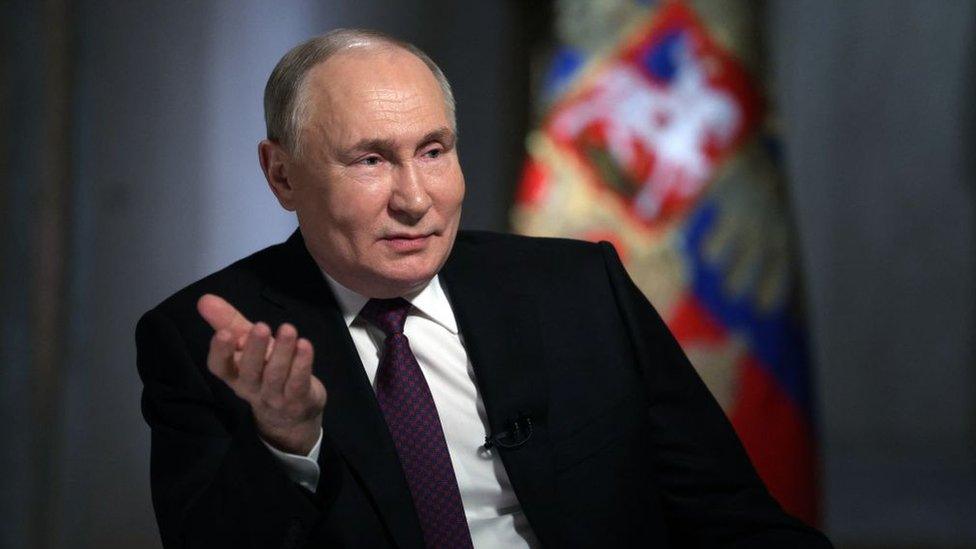Putin's fifth term as Russian president was predictable, but what comes next?
- Published
Watch: Supporters applaud Putin as he thanks Russians for putting their trust in him
As predictions go, a Putin landslide was the easy one.
No crystal ball or tea leaves required there.
After all, in Russia the Kremlin tightly controls the political system, including elections.
But what will Vladimir Putin do with his 87%? What will a fifth Putin term look like?
Putin 5.0 may not be so different from Putin 4.0
Don't expect an "Abracadabra moment" where, with a wave of a magic wand, the hawk suddenly turns into a dove.
Chances are that President Putin will continue along his current path of conflict abroad and crackdown at home.
Looking ahead, that probably means a continuation of the war in Ukraine - and confrontation with the West - plus an ideological campaign on the domestic front as Putin pushes on with his transformation of Russia into an increasingly militaristic society.
As for Russian civil society, that's already under intense pressure. That may well intensify.
That 87% is an astronomical figure.
True, it won't convince Western leaders that it is a genuine reflection of Putin's current level of popularity.
"This is not what free and fair elections look like," commented British Foreign Secretary David Cameron about Russia's presidential vote.
But domestically, it allows the Kremlin to argue that the whole nation has united around Vladimir Putin and that the Russian president has the full support of his people.
Crucially, he can now claim to have a popular mandate for his war in Ukraine and for the direction in which he's leading Russia.

Watch Live: Putin Claims Russian Election Landslide
Vladimir Putin claims a landslide election victory, but faced no credible opposition.

The 87% also sends a clear message to Russia's political elite: "Take note, there's still only one man in charge here, in control - and that's not going to change any time soon."
And that's important for Vladimir Putin, less than a year after the brief, but dramatic mutiny by the Wagner mercenary group. That uprising, led by Yevgeny Prigozhin, had posed a direct challenge to Putin's authority.
In the end, it was the Kremlin leader who came out on top. Two months after the mutiny, Prigozhin was dead, killed in a plane crash.
One more thing about 87% - it's a great confidence booster. When you're president, and you're told you've won yet another landslide, it can make you feel even more powerful, invincible even.
In Putin's victory news conference on Sunday night, that confidence shone through.
It was the confidence of a leader who's already been in power for a quarter of a century and is set to become the longest-serving Russian leader since Catherine the Great.
The confidence of a leader who has constructed a political system which delivered him 87% of the vote and a fifth presidential term.
He spoke confidently about Russia's progress in the war in Ukraine, where he claims the initiative is "fully" on the side of his country; he ripped into Western democracy; and he predicted that post-election Russia would grow stronger.
Critics point out that political confidence in a leader - especially over-confidence - can be dangerous.
Especially in the absence of checks and balances in a country's political system.
There are few of those in today's Russia.
Related topics
- Published17 March 2024
